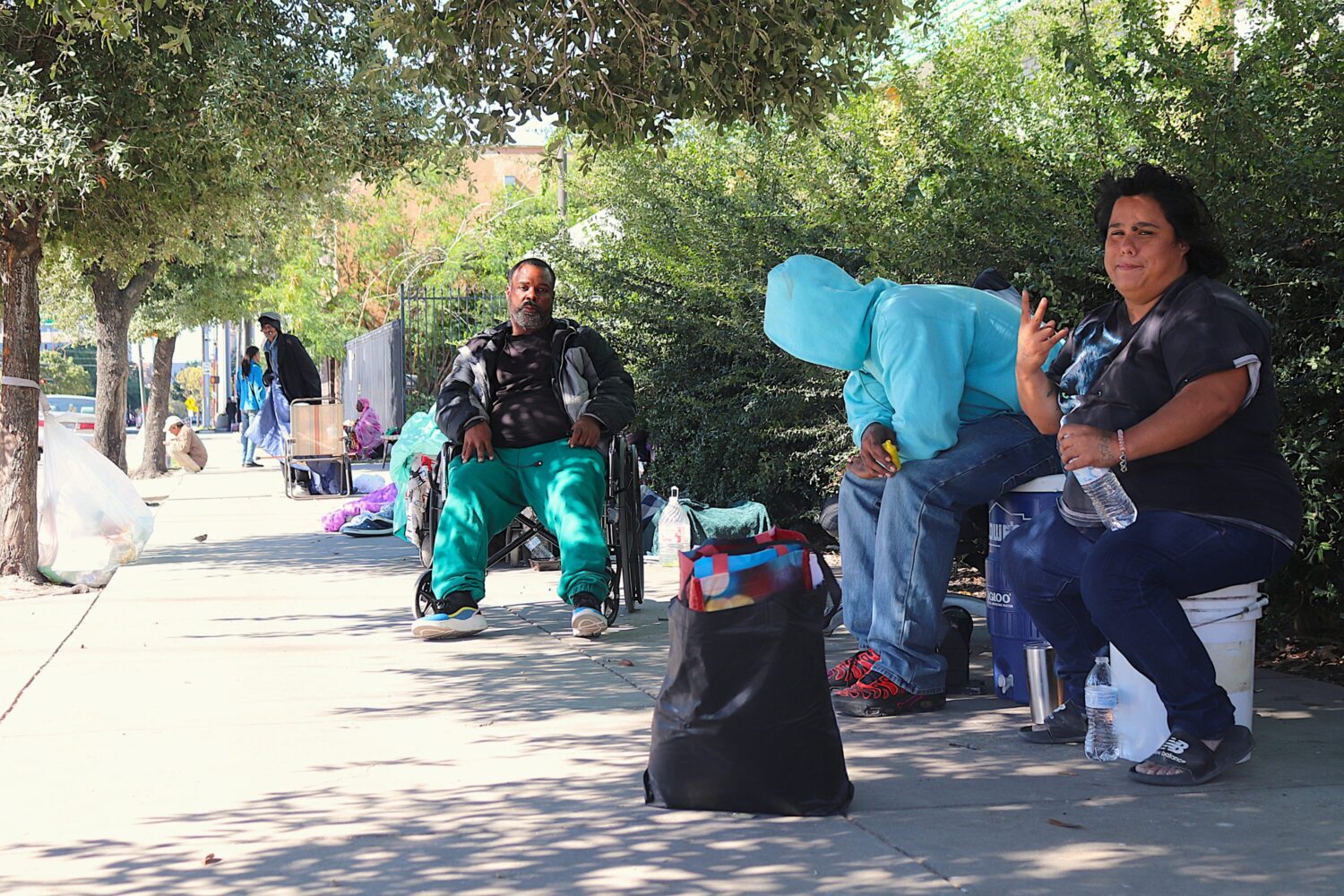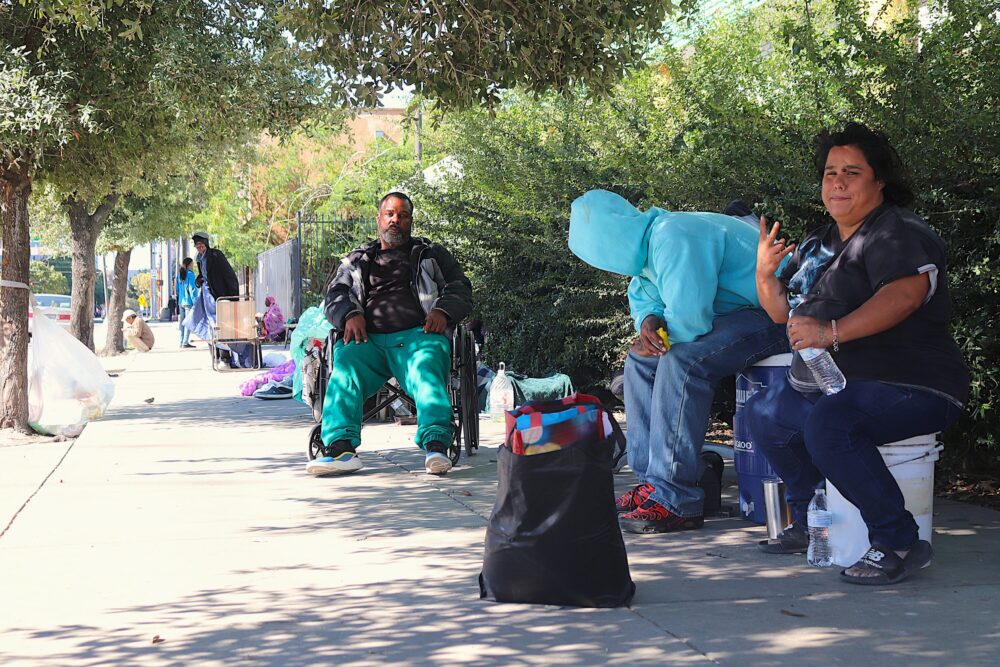Dominic Anthony Walsh/Houston Public Media
Trazawell Franklin, left, and April Jamarillo, right, sit in front of the SEARCH Homeless Services center on Nov. 11, 2025.
After city officials expanded the so-called civility ordinance in mid-July, effectively banning homeless people from sidewalks in certain parts of Houston, law enforcement officers also ramped up enforcement of a separate, citywide rule prohibiting more general sidewalk obstructions.
The enforcement of the more general rule calls into question the necessity of the civility ordinance. The data, first reported by Houston Public Media, comes as Houston Mayor John Whitmire urges the city council to approve another expansion of the civility ordinance to cover the Greater East End.
Breaking down the data
Separate from the civility ordinance — which prohibits sitting, lying down or placing personal possessions on sidewalks in 10 areas of the city during the day as well as at all hours in downtown and East Downtown — it’s also illegal “for any person to place, cause, or allow any impairment or obstruction of a sidewalk or roadway, except as authorized by a permit.”
Citations for that more general law jumped after the city council approved the all-hours civility ordinance in the central urban core in mid-July, according to data from the city’s municipal courts. Before that expansion, law enforcement officers issued an average of three citations per month for general sidewalk obstructions. In the three months after the expansion of the separate civility ordinance in mid-July, the average jumped to more than 100 citations per month.
Just over half of those cited listed their address as “homeless,” and it’s unclear how many of those with addresses listed actually lived on the street — a common feature of those who also received civility ordinance citations.
Citations for violations of the civility ordinance also surged, from a monthly average of 159 before the expansion to 244 after mid-July.
In some cases, individuals received citations for violations of multiple rules at the same time.
Separately, between four and eight sidewalk vendors or merchants received citations each of the past three months for operating on sidewalks without a permit — up from zero for the rest of 2025.
A Houston Police Department spokesperson questioned whether all the citations — for violations of municipal laws — were issued by the department but otherwise did not comment on the trend.
In a statement, Whitmire’s public safety and homeland security director Larry Satterwhite said, “these are individuals who repeatedly violate the law and ordinances and have been warned several times.”
“When these individuals go to homeless court or to municipal court, they are engaged and offered help and services. This is another opportunity to lift them off the streets,” Satterwhite said. “It is dangerous and unhealthy for them to live outside on the streets and it has a severe impact on the surrounding community. We are trying to improve their lives but some are sick or addicted to drugs and refuse our help.”
He did not directly address why the civility ordinance expansion is necessary given the existing sidewalk obstruction law.
Homeless people face hefty fines, long waits for housing
Sitting in front of the nonprofit SEARCH Homeless Services center in Houston’s East Downtown, Trazawell Franklin said Houston Police Department officers began telling people to move off the sidewalks more often over the summer. He received two citations for violating the civility ordinance in June was fined more than $500, according to records from the city’s municipal courts.
“If I could talk to the mayor — which no one out here is really capable of talking to the man — I would try to get to an understanding about the sidewalk, because the sidewalk belongs to the city, the people. It doesn’t belong to him,” Franklin said. “Let’s get the resources up and mobile before you try to administer an ordinance or a law.”
Franklin described the process of getting into permanent housing as “extremely slow,” saying he’s had to start over multiple times over the past five years after missing deadlines.
According to officials, the city and its partners have moved just over 200 people into permanent housing over the past year.
While Franklin said he’s seen increased enforcement, people in the area have been subject to ticketing and fines for years.
On the same block where he received his tickets, one woman received more than 780 citations for violations of the civility ordinance from 2016 through 2025. She racked up nearly $200,000 in fines — $150,000 of which was dismissed after officers failed to appear in court; another $50,000 of which she still owed to the city as of mid-October.
Attempts to reach her were unsuccessful.
The increased enforcement of sidewalk obstruction rules, first reported by Houston Public Media, comes as the city council considers another expansion of the civility ordinance across the Greater East End — which, if approved, would be the third expansion over the past year.
Sarah Grunau/Houston Public Media
Pictured is the inside of a proposed resource center for homeless people in Houston, located at 419 Emancipation Ave.
City officials argued the expansion is necessary because of an upcoming homeless services center at 419 Emancipation Ave. that could temporarily shelter up to 320 people at a time. The site sits on the edge of the East Downtown civility zone, which ends a few yards to the east.
According to the Coalition for the Homeless of Houston and Harris County, there were 66 homeless people sleeping on the streets across the Greater East End as of its point-in-time count in January. Some residents fear the upcoming facility could bring more homeless people to public spaces in the area.
Although the general sidewalk obstruction ordinance is in effect across the city, officials said the Greater East End needs an all-hours civility ordinance to allay the concerns of those residents.
In a statement, city council member and housing committee chair Tiffany Thomas signaled support for the expansion due to the advocacy of East End council member Joaquin Martinez — but she also indicated skepticism.
“We can’t police our way out of poverty or police our way into public safety,” Thomas said. “Especially when we are still in the process of making sure our coordinated care system operates on all cylinders for homeless Houstonians. I fear we may be working against our stated intentions.”
Martinez and city council member Mario Castillo, who represents the Second Ward portion of the proposed expansion, did not respond to requests for comment.
Layla Dajani contributed to this report.


